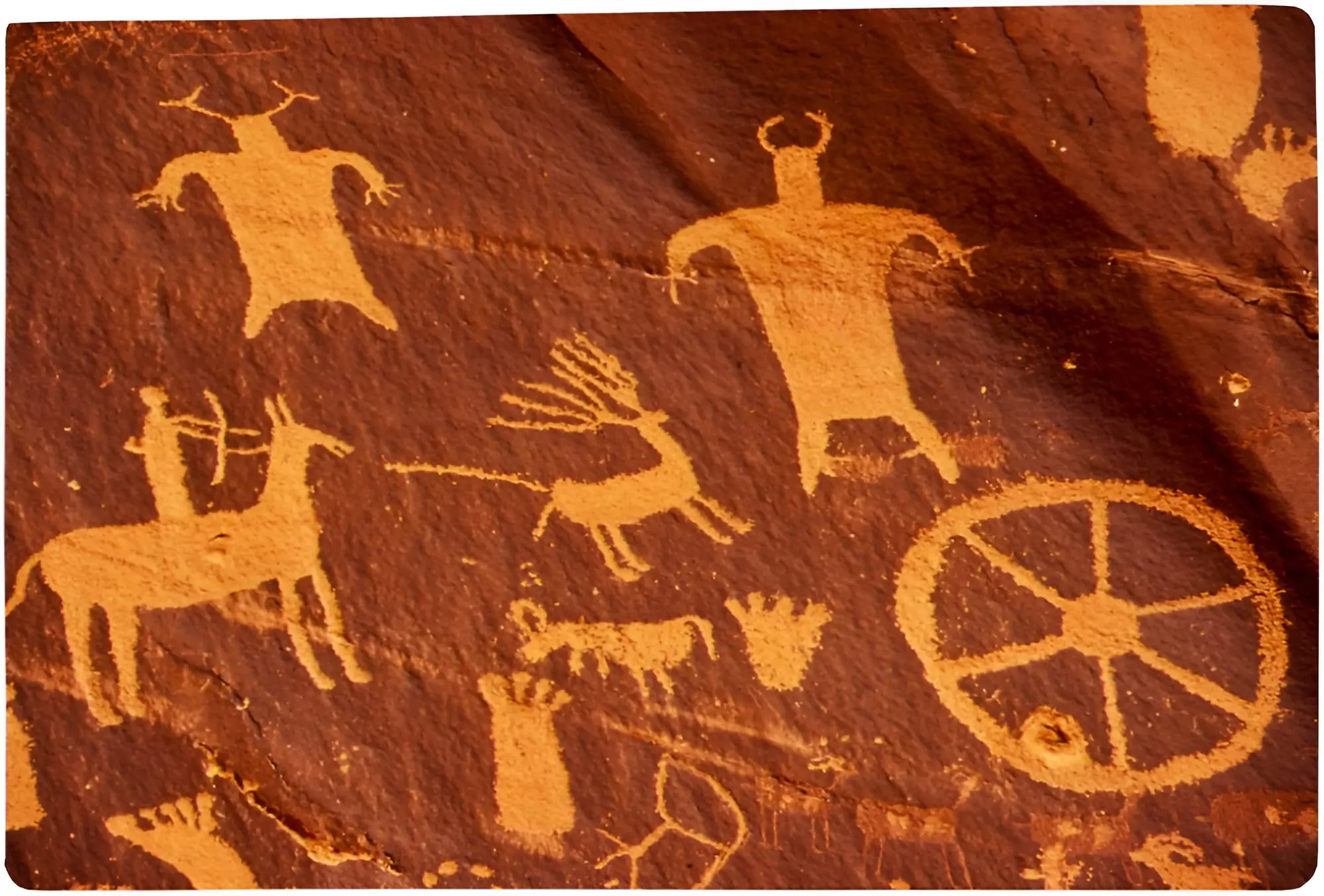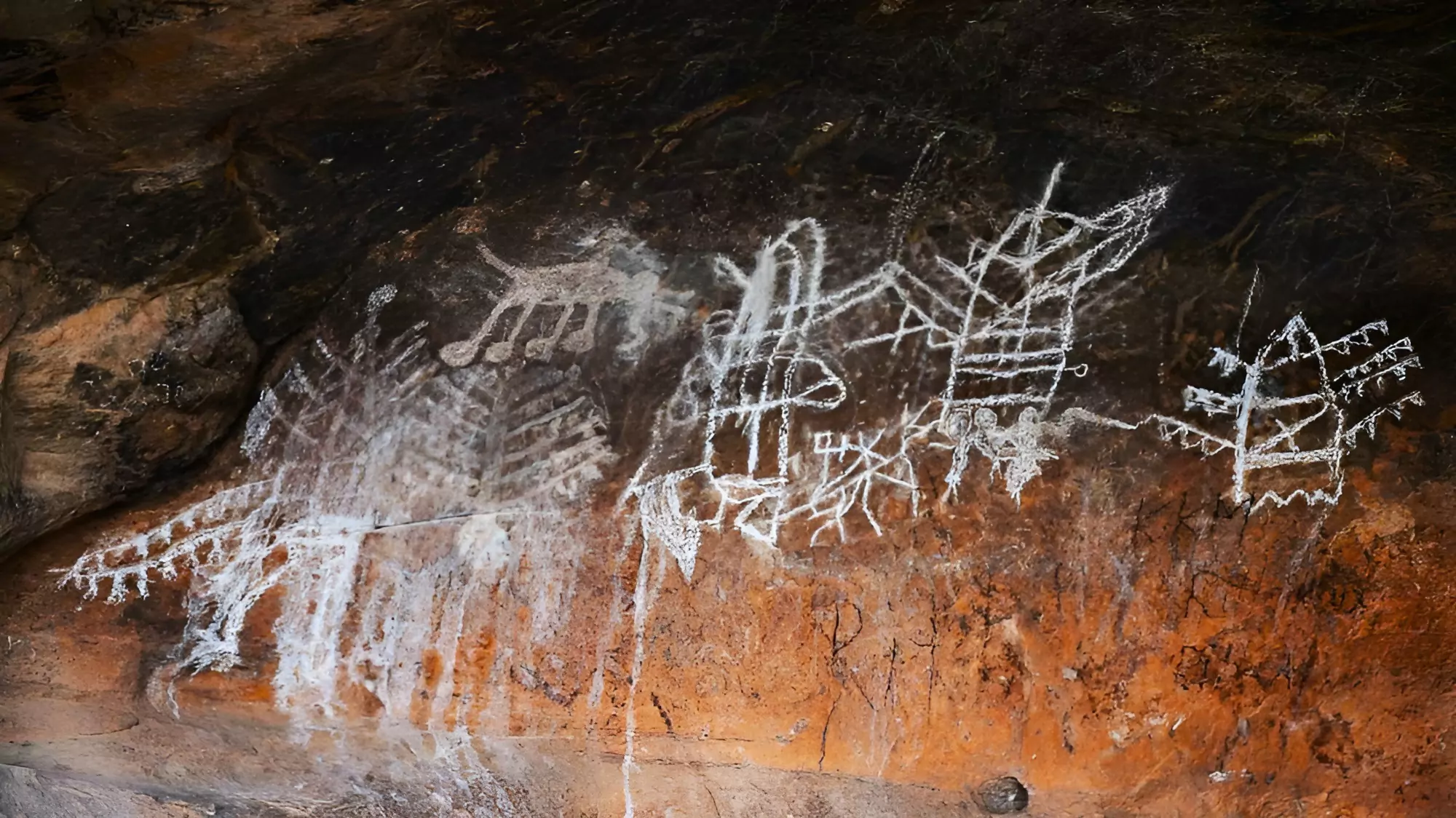Context
Miscreants have damaged the Kumittipathi Rock Paintings in the cave at Kumittipathi, a village near Coimbatore, Tamil Nadu.
Kumittipathi Rock Paintings
- These Kumittipathi Rock Paintings are among the most important rock art in the Kongu region and are around 3,000 years old.
- They are drawn with white pigments on the walls of a natural cave and depict animals, human figures, and chariots.

About Rock Art
- Rock art refers to drawings, paintings, or similar works created on or of stone, typically from ancient or prehistoric times.
- It includes various forms, such as drawings (pictographs), carvings (petroglyphs), engravings, rock arrangements (petroforms), and ground drawings (geoglyphs).
- These artworks often show ancient animals, tools, and human activities, offering insights into past daily life. However, they are often symbolic rather than realistic.
- Rock art sites can have art from different centuries, showing the evolution of artistic styles over time.
- Cave Painting
- Cave paintings are a type of rock art known as pictographs.
About Kumittipathi Rock Paintings at Pathimalai in Kumittipathi

- Variety of Depictions: Besides the elephant, the Kumittipathi Rock Paintings portray a chariot (interpreted by some as a peacock), human figures, and scenes from the lives of ancient inhabitants.
- Caves used for Dwellings: Small holes are also present that might have been used by the people who lived there to store water and other things.
- Variety in Age and Materials:
- The rock expert suggests not all Kumittipathi Rock Paintings are from the same period.
- Materials: Artists likely used inorganic white pigment and natural gum.
- Similar Paintings in the Region: Rock paintings resembling those at Kumittipathi can be found at Vellarukkam Palayam, Viraliyur, and Kovanur.
- They depict hunting scenes and other activities.
- Interpretation of elephant image
- Age: The elephant image is believed to be among the oldest paintings in the cave.
- Possible meaning:
- Elephant trade: Some argue that the elephant image indicates the practice of capturing wild elephants and their trade owing to the proximity of Kumittipathi to two places:
- Mavuthampathi (suggesting a place inhabited by mahouts)
- Velanthavalam (a place for Vezham, which means elephant).
- There is no evidence to support the claim: Others say there is no historical evidence linking the paintings to the two places.
Historian’s Perspective on Elephant Trade
- Denial of Elephant Trade: Historians disagree that the Kumittipathi Rock Paintings represents elephant trade, citing the absence of a governing empire in the region during the painting’s creation.
- Trade with Romans: Trade in the area with the Romans has been supported, but no historical evidence connects the paintings to the elephant trade.
- Alternative Interpretation:
-
- Daily activities or religious practices: According to some historians, the rock paintings may depict daily activities or religious practices rather than the elephant trade.
- Festival or an organized society: It has been suggested that an image interpreted as people pulling a chariot might symbolize something different, such as a festival or an organized society.
- Despite being attributed to hunters, the paintings could serve as a representation of broader societal aspects.
Historian Perspective on Kumittipathi Rock Paintings
-
Purpose:
- According to the archaeologists, the Kumittipathi Rock Paintings were created by tribal people for entertainment or because they believed that depicting hunting scenes increased hunting success.
- However, there are few hunting scenes at Kumittipathi.
-
Meaning of a Specific Figure (Car):
-
- According to archaeology, a figure resembling a car might be a peacock.
-
Murugan Temple:
- A Murugan temple atop the hillock suggests that early inhabitants may have worshipped the deity.
- There are also megalithic burial sites in the region
-
Dating the Kumittipathi Rock Paintings:
-
- By linking the paintings to nearby megalithic burial sites, archaeologists estimate the art could date back to the 5th Century BCE.
-
Geographical Significance:
- Kumittipathi is situated in the Palakkad Gap of the Western Ghats, a notable break in the mountain range.
- This geographical feature has historically served as a corridor connecting Tamil Nadu and Kerala.
- Trade route: There were ancient trade routes known as Peruvazhi in the Palakkad Gap.
- These trade routes existed between Anamalai and Ayyasamy Malai.
- Trade route in the Sangam period: During the Sangam period, three trade routes passed through Anamalai, Vellalore, and Avinashi.
Also Read: Bhimbetka Cave Painting
![]() 6 Apr 2024
6 Apr 2024

